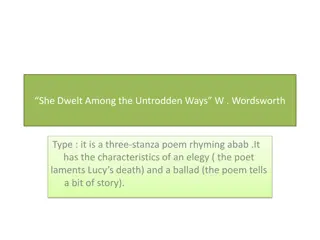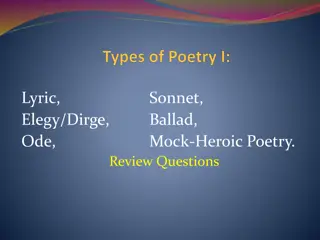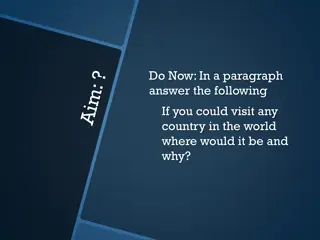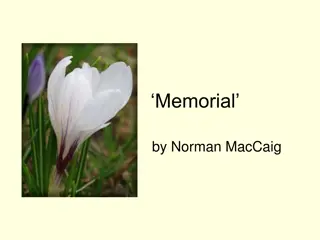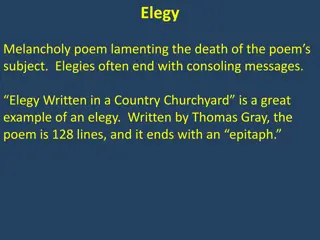
Pre-Romantic Poetry and the Graveyard School: Thomas Gray and the Transition to Romanticism
Explore the essence of Pre-Romantic poetry characterized by a shift towards simplicity, sincerity, and nature, as seen in the works of Thomas Gray and the Graveyard School of Poetry. Discover the themes, characteristics, and impact of this cultural movement that set the stage for Romanticism in the 18th century.
Download Presentation

Please find below an Image/Link to download the presentation.
The content on the website is provided AS IS for your information and personal use only. It may not be sold, licensed, or shared on other websites without obtaining consent from the author. If you encounter any issues during the download, it is possible that the publisher has removed the file from their server.
You are allowed to download the files provided on this website for personal or commercial use, subject to the condition that they are used lawfully. All files are the property of their respective owners.
The content on the website is provided AS IS for your information and personal use only. It may not be sold, licensed, or shared on other websites without obtaining consent from the author.
E N D
Presentation Transcript
THOMAS GRAY AS A GRAVEYARD POET Elegy Written in a Country Churchyard
Thomas Gray One of the most important English poets of the 18th Century Born in Cornhill on 26 December, 1716 Died in Pembroke on 31 July, 1771 Pre-Romantic Poet Transitional Poet Graveyard School of Poetry Elegy Written in a Country Churchyard 1751
Pre-Romantic Poetry Pre-Romanticism A cultural movement in Europe from the 1740s to 1790s Preceded the artistic movement known as Romanticism Marked a shift in public taste away from the grandeur, nobility, idealization, and Neoclassicism or Classicism toward simpler, more sincere, and more natural forms of expression Reflected the tastes of the growing middle class, who rejected the artificial and overly sophisticated tastes of the aristocratic class The development of the natural-appearing English garden in contrast to the geometric vistas of the French formal garden elevated sentiments of
Characteristics of Pre-Romantic Poetry Not intellectual in content and treatment Passion, emotion and imagination are valued by them above the cold light of intellectuality Return to the lyric Show a new appreciation of the world of Nature which neoclassical poetry had mostly neglected They do not limit their attention to urban life and manners only
Themes of Pre-Romantic Poetry a return to nature -- an interest in the picturesque, the wild, the grandiose, the lonely, the desolate sensibility and melancholy -- love of ruins, idealization of solitude and meditations on man s unhappy destiny a sense of primitive life -- civilization and a longing for earthly paradise a love of the strange, the exotic and the sublime an interest in the middle age which is considered a mysterious period an interest in gothic architecture as a typical expression of the medieval spirit the claim of imagination against reason (imagination must not be subordinated to intellect)
Graveyard School of Poetry Genre of 18th-century British poetry -- death and bereavement and Gentle melancholy -- 1740s and 50s Robert Blair -- The Grave (1743) ; Edward Young -- Night Thoughts (1742 45) Express sorrow and pain of bereavement -- the transitory nature of human life Meditative, philosophical tendencies of graveyard poetry -- full expression in Thomas Gray s An Elegy Written in a Country Church Yard (1751). Celebrates the unsung lives of humble and unsung villagers, suggesting that the lives of rich and poor alike lead but to the grave Significant as early precursors of the Romantic Movement
Characteristics of Graveyard Poetry Melancholy tone and choice of cemeteries, tombs, ruins, desolate landscapes and stormy skies as the setting Musings on the vicissitudes of life, the solitude of death and the grave, bereavement and the anguish of Made use of three themes: retirement, "memento mori" (the reminder that the grave awaits) and the vanity of human pretensions
What is an Elegy? A meditative lyric poem lamenting the death of a public person or of a friend or loved one A reflective lyric on the theme of human mortality In classical literature an elegy was any poem written in the elegiac metre (alternating lines of dactylic hexameter and pentameter) and was not restricted to a subject English literature, since the 16th century, elegy has come to mean a poem of lamentation, written in any metre of the poet s choice
Background Thomas Churchyard -- first published in 1751. Began writing the poem in 1742, shortly after the death of his close friend Richard West Completed when Gray was living near St Giles' parish church at Stoke Poges Earlier title: Stanzas until his friend William Mason suggested Elegy Embodies a meditation on death, and remembrance after death A deliberation on unused human potential and mortality Gray's Elegy Written in a Country
Tone and Mood Tone of the poem is sad and somber Mood of the poem is sorrowful and solemn Poet mulls calmly over death while standing in a rural graveyard in the evening Reflects that death comes for everyone in the end, rich and poor alike. Commemorates the common churchyard by recreating the lives they might have lived had they been born into better circumstances and considers the benefits of anonymity Ends with his own imagined Epitaph folk buried in the
Setting The time is evening and every living being on earth is retiring for the night As the poem opens, the speaker is seen at the churchyard; he hears the usual evening sounds The church bell is ringing The shepherds and their cattle are returning home after the day s work The location is rural; a pastoral setting The atmosphere is subdued and melancholic Darkness and silence fill the place except for the hooting of the owl, the buzz of the beetle, and the ringing of the bells
Form and Style 33 stanzas; 128 Lines Each stanza has four lines Quatrains Four lines with iambic pentameter constitute each stanza. A pentameter consists of ten syllables. Also, the first and the third lines rhyme at the ending; the second and the fourth lines rhyme at the ending of each stanza. The rhyme scheme is abab, cdcd, efef The poet makes use of several tenses in "Elegy Written in a Country Churchyard": present to describe the graveyard, past to describe the dead, and future to imagine later visitors' thoughts.
Poetic Devices Narrator: Poet is the sole narrator - first-person point of view with an occasional shift to third-person point of view. Contains three voices, with the first 23 stanzas spoken by the dead youth, a voice many imagine to be fashioned on that of West. The following five lines Gray speaks, while lines 98 116 are spoken by a hoary- headed swain, or country man, and Gray supplies the concluding 12-line epitaph Irony: Speaks as if he does not care for name and fame. However, he is eager to be remembered and honored after his death through his epitaph Allusions: Many historical figures, e.g. Cromwell and Milton. Muse is a literary allusion. God and Father are biblical allusions. Through word choice, metaphor, and allusion, Gray often uses one word to suggest many ideas
Literary Devices Metonymy and Synecdoche: Concrete words are used to represent abstract ideas celestial fire represents divine power; rod of empire represents royal power; living lyre represents beauty "Dauntless breast" and "heart" are used to indicate human body and man Personification: Many abstract ideas are personified - such as knowledge, pride, honor, grandeur , with their initial letters capitalized Onomatopoeia: Cock's shrill clarion, twittering of swallows, drowsy tinkling, knell are onomatopoeic words Metaphor: poverty "froze the genial current of the soul suggesting that the current is the soul; "Chill Penury [poverty] stops this "current" by freezing it and artistic power.
Symbolism Nightfall: This gentle image is also a symbol of death; as nightfall indicates the end of day, death indicates the end of life. A herd of cattle prepares for sleep, the plowman heads home, and darkness descends. The world becomes quiet. In the first line the curfew bell "tolls the knell of parting day," like a bell rung at a funeral. Then, in the last lines of Stanza 4, the reader learns that the peasants have not just gone to sleep for the night. Instead, the village "forefathers" sleep in their graves. The Grave: He talks about it not as something frightening, but as a symbol of death, the great equalizer. A grave is a monastic "cell" where the dead sleep. Death, he points out is inevitable: "The paths of glory lead but to the grave. The graves of the great are decorated with urns and statuary. Yet, the graves of the poor around him are also decorated. a "frail memorial ... / With uncouth rhymes and shapeless sculpture deck'd."
Major Characters Speaker: the poet himself; also mentioned as the Youth in the Epitaph Oliver Cromwell (1599 1658): was an English soldier and statesman. He led forces against King Charles I (1600 49) during the English Civil War (1642 51) and later led England to powerful world status John Hampden (1594 1643): was a member of Parliament. He accepted a prison sentence in 1627 rather than pay taxes levied by Charles I (1600 49) John Milton (1608 74): was an English poet. He opposed the tyranny of Charles I (1600 49) and the state religion of the Church of England Muse: In Greek and Roman mythology, the Muses are a group of sister goddess who serve as patrons to the arts. the "Muse's flame Plowman: represents all the living people leading simple lives in and around the village Rude forefathers: are the founders of the village, who are now buried in the churchyard. rude may mean "unlearned" or "inelegant
Inspiration Horace Walpole published the elegy in a quarto-sized pamphlet The quarto sold out, to be reprinted multiple times over the following years. The language, more than theme, captured the imagination of not only the ordinary reader, but also poets including George Gordon, Lord Byron and Alfred Lord Tennyson Thomas Hardy loved this poem and he used some of the same ideas and themes in his poem, "Afterwards," and used a line of the poem to title his novel, Far From the Madding Crowd. Jane Austen made Mrs. Elton quote from this poem in her novel Emma William Wordsworth used Thomas Gray as an example of what NOT to do as a poet in his "Preface to Lyrical Ballads"
Lines 1-12 The curfew tolls the knell of parting day, The lowing herd wind slowly o'er the lea, The plowman homeward plods his weary way, And leaves the world to darkness and to me. Now fades the glimm'ring landscape on the sight, And all the air a solemn stillness holds, Save where the beetle wheels his droning flight, And drowsy tinklings lull the distant folds; Save that from yonder ivy-mantled tow'r The moping owl does to the moon complain Of such, as wand'ring near her secret bow'r, Molest her ancient solitary reign.
Lines 13-24 Beneath those rugged elms, that yew-tree's shade, Where heaves the turf in many a mould'ring heap, Each in his narrow cell for ever laid, The rude forefathers of the hamlet sleep. The breezy call of incense-breathing Morn, The swallow twitt'ring from the straw-built shed, The cock's shrill clarion, or the echoing horn, No more shall rouse them from their lowly bed. For them no more the blazing hearth shall burn, Or busy housewife ply her evening care: No children run to lisp their sire's return, Or climb his knees the envied kiss to share.
Lines 25-40 Oft did the harvest to their sickle yield, Their furrow oft the stubborn glebe has broke; How jocund did they drive their team afield! How bow'd the woods beneath their sturdy stroke! Let not Ambition mock their useful toil, Their homely joys, and destiny obscure; Nor Grandeur hear with a disdainful smile The short and simple annals of the poor. The boast of heraldry, the pomp of pow'r, And all that beauty, all that wealth e'er gave, Awaits alike th' inevitable hour. The paths of glory lead but to the grave. Nor you, ye proud, impute to these the fault, If Mem'ry o'er their tomb no trophies raise, Where thro' the long-drawn aisle and fretted vault The pealing anthem swells the note of praise.
Lines 41-56 Can storied urn or animated bust Back to its mansion call the fleeting breath? Can Honour's voice provoke the silent dust, Or Flatt'ry soothe the dull cold ear of Death? Perhaps in this neglected spot is laid Some heart once pregnant with celestial fire; Hands, that the rod of empire might have sway'd, Or wak'd to ecstasy the living lyre. But Knowledge to their eyes her ample page Rich with the spoils of time did ne'er unroll; Chill Penury repress'd their noble rage, And froze the genial current of the soul. Full many a gem of purest ray serene, The dark unfathom'd caves of ocean bear: Full many a flow'r is born to blush unseen, And waste its sweetness on the desert air.
Lines 57-68 Some village-Hampden, that with dauntless breast The little tyrant of his fields withstood; Some mute inglorious Milton here may rest, Some Cromwell guiltless of his country's blood. Th' applause of list'ning senates to command, The threats of pain and ruin to despise, To scatter plenty o'er a smiling land, And read their hist'ry in a nation's eyes, Their lot forbade: nor circumscrib'd alone Their growing virtues, but their crimes confin'd; Forbade to wade through slaughter to a throne, And shut the gates of mercy on mankind
Lines 69-84 The struggling pangs of conscious truth to hide, To quench the blushes of ingenuous shame, Or heap the shrine of Luxury and Pride With incense kindled at the Muse's flame. Far from the madding crowd's ignoble strife, Their sober wishes never learn'd to stray; Along the cool sequester'd vale of life They kept the noiseless tenor of their way. Yet ev'n these bones from insult to protect, Some frail memorial still erected nigh, With uncouth rhymes and shapeless sculpture deck'd, Implores the passing tribute of a sigh. Their name, their years, spelt by th' unletter'd muse, The place of fame and elegy supply: And many a holy text around she strews, That teach the rustic moralist to die.
Lines 85-100 For who to dumb Forgetfulness a prey, This pleasing anxious being e'er resign'd, Left the warm precincts of the cheerful day, Nor cast one longing, ling'ring look behind? On some fond breast the parting soul relies, Some pious drops the closing eye requires; Ev'n from the tomb the voice of Nature cries, Ev'n in our ashes live their wonted fires. For thee, who mindful of th' unhonour'd Dead Dost in these lines their artless tale relate; If chance, by lonely contemplation led, Some kindred spirit shall inquire thy fate, Haply some hoary-headed swain may say, "Oft have we seen him at the peep of dawn Brushing with hasty steps the dews away To meet the sun upon the upland lawn.
Lines 101-116 "There at the foot of yonder nodding beech That wreathes its old fantastic roots so high, His listless length at noontide would he stretch, And pore upon the brook that babbles by. "Hard by yon wood, now smiling as in scorn, Mutt'ring his wayward fancies he would rove, Now drooping, woeful wan, like one forlorn, Or craz'd with care, or cross'd in hopeless love. "One morn I miss'd him on the custom'd hill, Along the heath and near his fav'rite tree; Another came; nor yet beside the rill, Nor up the lawn, nor at the wood was he; "The next with dirges due in sad array Slow thro' the church-way path we saw him borne. Approach and read (for thou canst read) the lay, Grav'd on the stone beneath yon aged thorn."
THE EPITAPH Here rests his head upon the lap of Earth A youth to Fortune and to Fame unknown. Fair Science frown'd not on his humble birth, And Melancholy mark'd him for her own. Large was his bounty, and his soul sincere, Heav'n did a recompense as largely send: He gave to Mis'ry all he had, a tear, He gain'd from Heav'n ('twas all he wish'd) a friend. No farther seek his merits to disclose, Or draw his frailties from their dread abode, (There they alike in trembling hope repose) The bosom of his Father and his God.
BIBLIOGRAPHY Lonsdale, Roger, ed. The Poems of Thomas Gray, William Collins, Oliver Goldsmith. New York: Longman, 1969. Sells, A. L. Lytton. Thomas Gray: His Life and Works. London: George Allen & Unwin, 1980.







